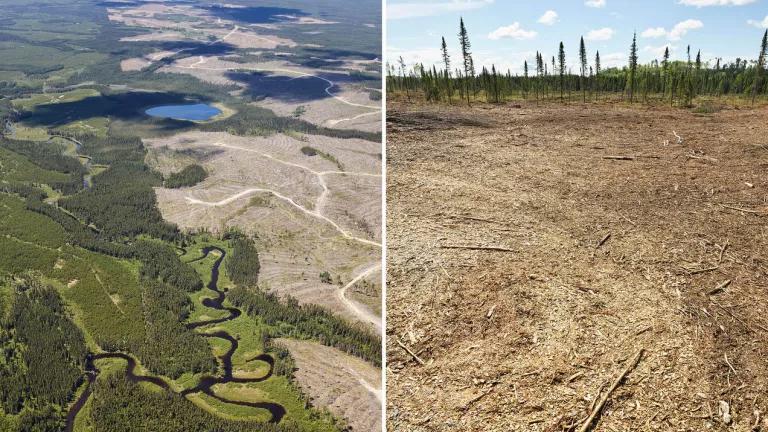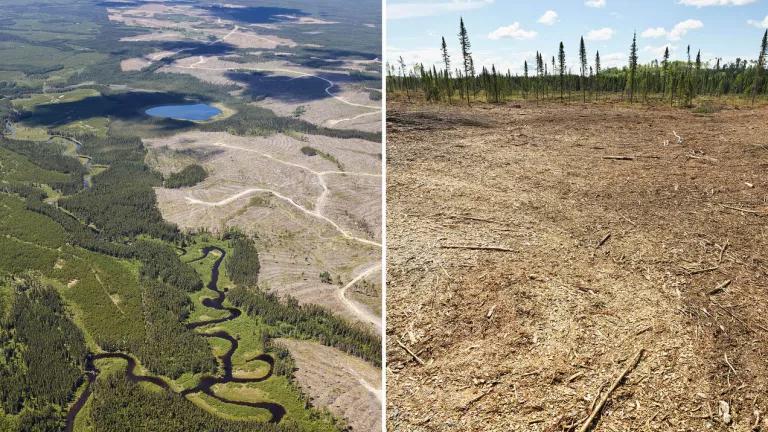P&G’s Board Must Be Accountable for Forest Destruction
Ten months after Procter & Gamble’s (P&G’s) shareholders resoundingly called on the company to address its impacts on climate-critical forests and Indigenous rights, P&G has failed to take meaningful action.

Note: After this blog was published, Procter & Gamble announced that James McNerney will not be running for re-election to P&G's Board of Directors. Angela Braly, however, is running for re-election, and NRDC urges shareholders to oppose her re-election.
Ten months after Procter & Gamble’s (P&G’s) shareholders resoundingly called on the company to address its impacts on climate-critical forests and Indigenous rights, P&G has failed to take meaningful action. In light of this immense failure of leadership and P&G’s continued role in driving deforestation, primary forest loss, and violations of Indigenous Peoples’ rights through its tissue and palm oil supply chains, organizations are calling for P&G’s Board of Directors to be held accountable.
Last year’s shareholder proposal, issued by Green Century Capital Management and passed by 67 percent of P&G’s shareholders, called on P&G to determine how the company could “increase the scale, pace, and rigor of its efforts to eliminate deforestation and the degradation of intact forests in its supply chain.” While P&G has published a report and webpage outlining its sourcing policies, it has not addressed the fundamental issues that investors have raised, nor has it reduced the impacts its operations are having on communities and forests.
P&G has shown that it is both unable and unwilling to address the underlying risks that led to this shareholder proposal. Namely:
- P&G has said it will not eliminate sourcing from some of the most carbon-dense, ecologically vital primary forests in the world to make throwaway tissue products like Charmin toilet paper and Bounty paper towels.
- The company continues to source large volumes of pulp from threatened boreal caribou habitat for its tissue products.
- Indonesian communities reported grave human rights violations and deforestation by palm plantation companies at the upstream end of P&G’s supply chain, urged P&G to suspend sourcing from this company, and asked to meet, P&G deferred the issue to an intermediary supplier and refused to meet directly with the impacted community complainants.
- The company continues to rely heavily on third party certification systems that have failed to guarantee Indigenous rights and primary forest protection, and has refused to adopt due diligence practices that would provide additional protection against these challenges.
- P&G falsely claims on its investor website that all third-party certification systems it uses for pulp sourcing guarantee threatened species protections and free, prior, and informed consent of Indigenous Peoples.
- P&G also parrots false claims by Canadian federal and provincial governments about the sustainability of forestry operations in Canada, despite, ongoing logging in old growth forests, rapid species declines, environmental rollbacks, evidence of deforestation, and Canada’s recent ranking as having the third-highest intact forest loss in the world.
- Several of P&G's main palm oil suppliers are embroiled in ongoing controversies, and have not fully addressed grievances. FGV, one of the company's main suppliers and joint venture partner, continues to endure a withhold release order due to ongoing forced labor and human rights violations. Another direct supplier, Sime Darby, had a similar petition filed with U.S. Customs and Border Protection to block palm oil imports due to forced labor concerns. Yet another direct supplier, Golden Agri Resources, is linked to corruption as executives from its subsidiaries were sentenced to prison for bribing government officials.
- The company’s new policy on free, prior, and informed consent is both weak and unclear, giving little assurance that P&G will be able to determine whether a supplier has violated the policy, much less enact consequences against any violator.
Alarmingly, despite calls for P&G’s leadership to engage in these issues, the company continues to delegate responsibility to the staff who were responsible for addressing these issues before they rose to the shareholder level, and had largely failed to mitigate risks from these supply chain issues. Its leadership has shown no sign of making these continued failings a priority.
Ultimately, P&G has shirked its responsibility when it comes to sustainability. Given the stakes of our current moment--a unique and terrifying confluence of climate collapse, dramatic biodiversity loss, and human rights violations by extractive industries--P&G and its leadership cannot avoid responsibility any longer. That’s why NRDC and others are calling for investors to vote against two long-standing P&G Board members, Angela Braly & James McNerney.
Angela Braly is the chair of P&G’s Governance & Public Responsibility committee on the board. She has served on the board since 2009. In addition, Ms. Braly serves on the board of ExxonMobil, and until earlier this year, was the chair of their Public Issues and Contributions Committee. Ms. Braly’s role as a board member of one of the largest fossil fuel companies in the world undermines any credibility she might have in guiding the P&G board’s response to sustainability concerns.
James McNerney is P&G’s Lead Director of the board. He has served on the board for 18 years, which is nearly twice the national average for corporate boards, and may raise red flags for many investors whose policies note discomfort with boards that have overly long tenures. He is the former CEO of Boeing, and oversaw the development of the catastrophic 737 Max, raising questions of his ability to appropriately respond to risks.
Last year’s shareholder proposal was the first time a proposal related to forest loss passed in any corporation’s history. It set a precedent for heightened shareholder engagement, and was remarkable because all three of the largest asset management firms--BlackRock, State Street, and Vanguard--all supported the measure. The vote passed both because of P&G’s egregious track record, but also because investors are awakening to the fact that we have very few years with which we can solve the climate crisis, and that they must use their financial power to steer companies in the right direction--not only because it’s the right thing to do, but because environmentally regressive companies will face growing marketplace risks.
It should not take a two-thirds voting majority to convince a company to take the minimum required steps to save forests, the climate, and species, and to uphold human rights.
One thing should be clear to P&G’s shareholders this year: it should not take a two-thirds voting majority to convince a company to take the minimum required steps to save forests, the climate, and species, and to uphold human rights. P&G’s meager response proves that the company’s leadership does not take seriously its responsibility, as a Fortune 50 company with a market cap of $348 billion, to protect the planet and its people. Investors, and the world, can no longer afford corporate leadership that offers rhetoric and greenwashing rather than real solutions. It is time for P&G’s Board of Directors to be held accountable--shareholders should vote against Angela Braly and James McNerney.



